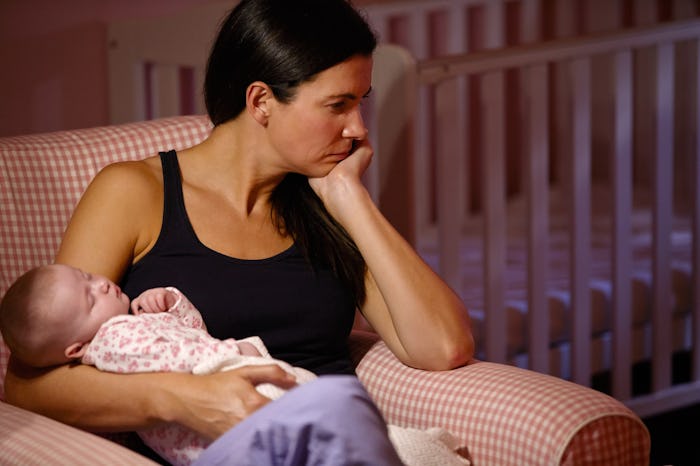Breastfeeding my newborn daughter was one of the most lovely, but exhausting things I've ever done. The first week she was home, she breastfed every two hours, like clockwork, and I found myself feeling more and more depressed every time she cried out of hunger. Looking back, I know it was the baby blues wreaking havoc on top of exhaustion, but I was curious. Can breastfeeding cause depression? It's a lot of work and takes a huge toll on you physically and emotionally — is there some kind of correlation?
Your mental health is incredibly important and motherhood, whether you're breastfeeding or not, seems to send it into a tailspin. According to the World Alliance for Breastfeeding Action (WABA), approximately 40 to 80 percent of all new moms experience "mild and transient mood disturbance" with 13 to 19 percent developing postpartum depression (PPD) when the symptoms last over two weeks. It makes sense — there are a lot of hormonal changes happening and it's easy to understand how, when coupled with the stress and anxiety of new motherhood, someone can find themselves in a depressive state.
Add in breastfeeding, and some moms may feel incredibly overwhelmed. From figuring out how to properly latch your baby to pumping milk for when you go back to work, it's understandable that the entire process of breastfeeding may contribute to your feelings of depression.
But it turns out breastfeeding doesn't actually make you depressed. Not in a clinical sense, that is. In fact, when it comes to your body and biology, breastfeeding can actually do the opposite when it comes to depression — breastfeeding can keep it at bay. But society's view of breastfeeding doesn't mesh with what science says.
International Board Certified Lactation Consultant (IBCLC) Leigh Anne O'Connor tells Romper in an email that breastfeeding itself does not cause depression, but that society's view on it can make moms feel more depressed than a mom who is formula feeding. "The problem is that bottle feeding is the cultural norm — we see images of babies bottle feeding in media and in real life," she says. "But the images of breastfeeding are often over romanticized. Breastfeeding is rarely taught, but because we know how important it is, people are told to do it — but with little instruction, so moms are reinventing the wheel over and over."
O'Connor adds that everyone seems to forget how birth has an impact on breastfeeding, too. "These days, birth is so controlled and medicalized so that the instincts of both moms and baby are sheathed by drugs," she says. "These moms want to do right, but have no idea how to and feel lost. The medical support team often has little knowledge to help these moms." O'Connor's theory is that when some of the moms stop breastfeeding and the pressure is off, they feel better, making breastfeeding feel like the problem. In reality, it's the way society views breastfeeding that can increase feelings of depression.
With that in mind, there's another way to prove that depression isn't caused by breastfeeding — science. According to La Leche League International (LLLI), the hormone responsible for making milk, prolactin, has a calming effect on the breastfeeding mother and can help her relax and give her a less intense response to adrenaline. Breastfeeding itself is also anti-inflammatory, which LLLI noted can lower a breastfeeding mom's risk of depression as well as protect her against other health issues, like heart disease and diabetes.
Still not convinced? Research has indicated that breastfeeding mothers also get more sleep. And more sleep means better mental health. LLLI's Breastfeeding Today suggested that even though breastfeeding mothers wake more often throughout the night, they get more sleep overall than moms who formula feed. Even though the average amount of extra sleep is just 20 minutes, it seems that's enough to positively affect a mom's well-being, as well as lower her stress levels and depression risks.
The truth is, breastfeeding doesn't cause clinical depression. But it is possible to be depressed while breastfeeding. Postpartum Progress noted that the stigma against formula feeding and the pressure to breastfeed can exacerbate PPD and make moms feel sad, discouraged, and down about their choices. The good news is, antidepressants are safe while breastfeeding. (It's also totally OK if you decide breastfeeding isn't for you.) The important thing to remember is that your mental health matters, so reach out to your doctor and your IBCLC if you're struggling with depression while breastfeeding. Together, they can come up with a plan that's best for baby and for you.
